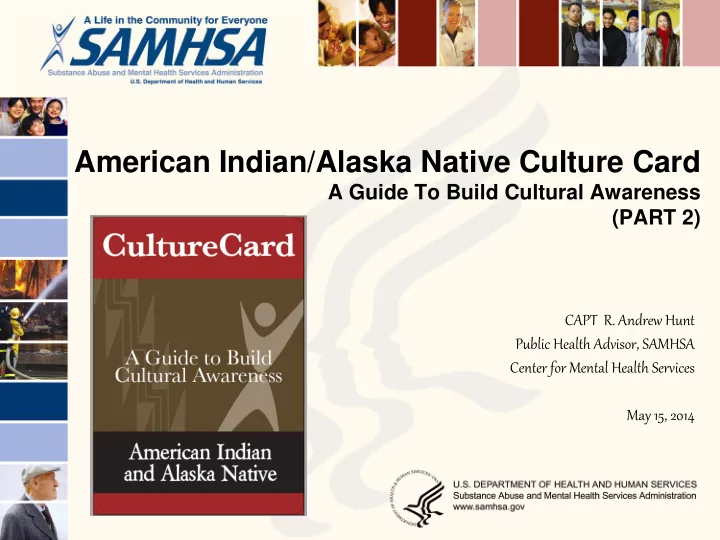

American Indian/Alaska Native Culture Card A Guide To Build Cultural Awareness (PART 2) CAPT R. Andrew Hunt Public Health Advisor, SAMHSA Center for Mental Health Services May 15, 2014
Culture Card – An idea is hatched… • Concept was inspired by the Iraq Culture Smart Card developed by the Marine Corps Intelligence Agency for the military deploying to Iraq. • The idea was to develop a “pocket guide” for non- Indian PHS Officers deployed to Indian Country in response to tribal suicide clusters. • In August of 2006 I assembled an ad hoc workgroup who volunteered their time over the next 2 years to develop content and review materials.
AI/AN Culture Card - Core Workgroup (2006-2008) PHS Commissioned Officers Indian Community Members • CAPT Lemyra DeBruyn • Shannon Crossbear (Lake Superior Ojibwa) – CDC • CAPT Andrew Hunt (Lumbee) • Carol Iron Rope Herrera (Oglala – SAMHSA Lakota) • CDR Laura Grogan • Terry Cross (Seneca) – HRSA • Vicky Oana (Chamorro) • CAPT Jean Plaschke (Lumbee) • Constance James (Turtle – SAMHSA Mountain Chippewa) • CAPT Stacey Williams – Walter Reed Behavioral Health Dept • CDR Betty Hastings – IHS
Purpose • …provide basic information for federal disaster responders and other federal health providers who may be deployed or otherwise assigned to provide or coordinate services in AI/AN communities • Intended to serve as a general briefing to enhance cultural competence while providing services to AI/AI communities. (cultural competence is defined as: the ability to function effectively in the context of cultural differences.) A more specific orientation or training should be provided by a member of the local community in any particular AI/AN community
Guiding Questions for the Workgroup to drive the content • For the AI/AN Community members: – “What are the important things for an outsider to know about your tribal community/culture before they came to work as a helper?” • For non-Indian PHS Officers/providers: – “Looking back at your tribal deployment experience, what are the things you wish you would have known about the culture or community before you arrived?”
AI/AN Culture Card – Development Process • Agree on categories/topic areas (16) • Develop content that was not too generalized as to reinforce stereotypes, but not too specific as to be irrelevant to differences among the 560+ tribes • Focus on practical information for non-Indian providers • Keep it strength-based • Review and decide on the format and graphics • Seek funding and approval to print • Spread the word and disseminate
AI/AN Culture Card - Workgroup effort • Members take responsibility for writing specific sections, get feedback from constituents and e-mail content to project lead • Project lead edits, condenses and re-drafts language for consistency and e-mails drafts to group for review • Monthly, or bi-monthly group conference calls to discuss each iteration of the draft • Individual calls and e-mails to address feedback members get from their constituents and make additional edits • Get feedback from informal focus groups at various AI/AN conferences and make necessary edits
The Final Product • Over 300,000 copies have been distributed since 2008. • An average of 4,111 copies are ordered each month, which does not include digital downloads of the pdf • Copies have been distributed throughout all 50 states and in many tribal/urban Indian organizations • Some tribes are taking the framework of the Culture Card and developing community-specific versions
Questions and Comments ? • The Culture Card can be obtained for free through SAMHSA’s Publication Clearinghouse. • Order Publication No. (SMA) 08-4354: • By phone at 1-877-SAMHSA-7 • Online at http://store.samhsa.gov/product/American- Indian-and-Alaska-Native-Culture- Card/SMA08-4354
Thank you Andrew Hunt, MSW, LICSW Captain, US Public Health Service Public Health Advisor Child, Adolescent and Family Branch Center for Mental Health Services Substance Abuse and Mental Health Services Administration 1 Choke Cherry Road, Room 6-1041 Rockville, MD 20857 E-mail: andrew.hunt@samhsa.hhs.gov Phone: 240-276-1926 Fax: 240-276-1930
Recommend
More recommend